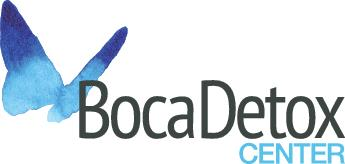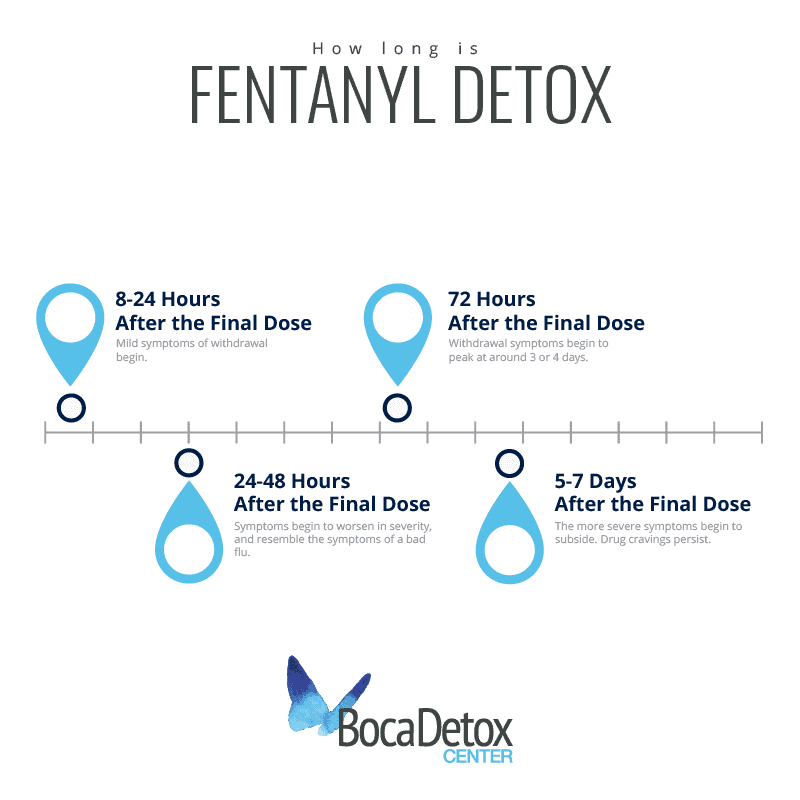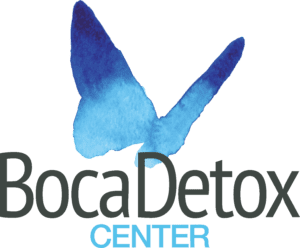Medically Assisted Fentanyl Detox
at Boca Detox
at Boca Detox
The initial step on every journey of addiction recovery is admission to a medically assisted detoxification center. Those who have been abusing drugs or alcohol for any period of time almost always undergo some degree of withdrawal upon abrupt cessation of use. More often than not, the symptoms of withdrawal will lead a person back to substance use before the detoxification process is over.
This is part of the reason why entering into an inpatient fentanyl detox program is so important.
At Boca Detox we provide a comprehensive detox program; one that focuses on more than a safe, pain-free drug and alcohol withdrawal. In addition to providing around the clock medical care, we actively prepare our clients for the next appropriate stage of their personal recovery journeys. During fentanyl detox, we conduct an individualized, in-depth evaluation, which helps us determine the length of our clients stay, what kind of medical intervention is necessary, and the next step for each client once they become physically stabilized.
The Boca Detox Center Method: Fentanyl Detox
At Boca Detox, we take a unique approach to fentanyl detoxification. Whereas state-funded facilities and hospital settings offer standardized, impersonal care, we treat each of our clients on a highly individualized basis. The Boca Detox method focuses on more than physical stabilization. We work to adequately prepare our clients to take the next appropriate step on their personal journeys of addiction recovery. While medical detox is an important initial step on the road to recovery, it must be closely followed by a higher level of care in order to be truly effective. As part of the Guardian Recovery Network family, we work closely with several of the top residential rehabs and outpatient treatment programs in the country. Once you have undergone a safe, pain-free fentanyl withdrawal and have been deemed physically stable, we will help you determine which level of care is right for you. Contact us today to learn more about fentanyl withdrawal treatment options, or to get started on your own personal journey of recovery.
Fentanyl is a potent and addictive painkiller used to treat moderate or severe pain. Just like other potent opioid narcotics like morphine and heroin, fentanyl works by binding to opioid receptors within the brain, blocking feelings of pain and stimulating feelings of euphoria. After using this specific drug several times, changes will begin to take place within the brain. After prolonged use (weeks, months or years depending on the individual), sensitivity within the brain will be diminished, making it nearly impossible to feel pleasure without fentanyl. At Boca Detox we understand how serious fentanyl addiction is and how severe the symptoms of withdrawal can be. For this reason, we have carefully developed a program of quality clinical care geared towards pain-free fentanyl detox and consistent client comfort. Our private, homestyle retreat lends itself to physical, emotional and psychological healing.
What is Fentanyl Addiction?
When a person misuses a chemical substance, it typically means one of three things. It might mean that an illegal substance is being used in any capacity. It might also mean that a prescription medication is being used other than as prescribed, or a legal substance (like alcohol) is being used in excessive quantities. When it comes to fentanyl misuse and addiction, it usually means that a person is taking a higher dose of fentanyl than recommended, or they are using the drug without a prescription written by a licensed medical professional. If you or someone you love has been struggling with a fentanyl use disorder, there are several signs and symptoms to keep an eye out for.
Signs of Fentanyl Misuse & Dependence
If you believe you or someone you love has been suffering from a diagnosable fentanyl use disorder, there are several signs and symptoms to keep an eye out for. The Diagnostic and Statistical Manual of Mental Disorders, Fifth Edition (DSM-V) outlines a list of diagnostic criteria used to identify the presence of an opioid use disorder. If you answer “yes” to two or more of the following questions, seeking professional help from a medical detox center is likely a good idea.
- Do you sometimes end up using a higher dose of fentanyl than you originally intended, or do you use fentanyl more frequently than you intend to?
- Have you wanted to cut back on your dose or quit entirely, only to find you were unable to do so for any significant period of time?
- Do you spend a significant amount of time obtaining fentanyl, using fentanyl and recovering from its effects?
- Do you often think of using fentanyl/do you ever experience intense cravings?
- Has your drug use interfered with your ability to fulfill personal obligations or negatively impacted your performance at work or at school?
- Have you experienced interpersonal problems as a direct result of your fentanyl use?
- Have you given up activities which were once interesting or important to you in order to engage in fentanyl use?
- Have you been engaging in risk-taking activities more often than normal, like driving while under the influence of fentanyl or combining fentanyl with other substances like alcohol or other opioid narcotics?
- Do you continue to use fentanyl despite physical or psychological health concerns directly related to the prescription medication?
- Have you developed a physical tolerance, meaning a higher dose is required in order for the desired effects to be achieved?
- Do you experience withdrawal symptoms when fentanyl use is stopped abruptly?
We Are Here For You
Let Us Help You Heal
Our detoxification experience is second to none.
Learn how we can help by speaking with one of our Treatment Advisors today.
What are the Signs & Symptoms of Fentanyl Withdrawal?
The symptoms associated with fentanyl detox can be extremely uncomfortable, but symptoms of opioid withdrawal rarely lead to life-threatening complications. Most people who undergo fentanyl withdrawal liken the symptoms to those of a particularly bad flu or cold.

If no physical or psychological complications develop, symptoms can typically be treated with a combination of over-the-counter medication and bed rest. However, fentanyl withdrawal will affect everyone differently, which is why entering into an individualized detox program is so important.
The Physical Symptoms of Fentanyl Withdrawal
The most common physical symptoms associated with fentanyl withdrawal include:
- Muscle aches and pains
- Stomach cramping
- Nausea and vomiting
- Flu-like symptoms, including watery eyes, runny nose, night sweats and chills
- Excessive yawning
- Restlessness/an inability to sit still
The Psychological Symptoms of Fentanyl Withdrawal
The most common psychological symptoms associated with fentanyl withdrawal include:
- Anxiety and panic attacks
- Depressed mood
- Suicidal ideation
- Intense drug cravings
Are Fentanyl Withdrawals Fatal?
Generally speaking, the symptoms associated with opioid withdrawal are not dangerous and can be effectively managed. However, it is always a good idea to enter into an inpatient detox program — even if your opioid use disorder was short-lived and you believe you can manage symptoms on your own. This is partially because the drug cravings that go hand in hand with fentanyl withdrawal can be so severe. In some cases, a person might attempt to detox at home and return to use in order to combat the cravings, but they might accidentally take more of the drug than their body can handle, leading to a life-threatening overdose. At Boca Detox we provide our clients with the medication they need to successfully avoid severe cravings and the structured environment they need to avoid relapse.
Our Detox Services Include
Fentanyl Withdrawal Timelines & What to Expect
The physical and psychological symptoms associated with fentanyl withdrawal typically begin within the 6 to 12 hours after the final dose and resolve within a week. The duration and severity of symptoms depends on how much fentanyl you were using on a regular basis.
A Standard Fentanyl Withdrawal Timeline Looks Like This:
- 8-24 hours after the final dose – Mild symptoms of withdrawal begin. These include general feelings of physical discomfort, restlessness, headaches, loss of appetite and drug cravings.
- 24-48 hours after the final dose – Symptoms begin to worsen in severity. In many cases, symptoms resemble the symptoms of a bad flu or cold.
- 72 hours after the final dose – Withdrawal symptoms begin to peak at around 3 or 4 days. These symptoms might include nausea, vomiting and diarrhea, severe stomach cramping, body aches and pains, restlessness, irritability and insomnia.
- 5-7 days after the final dose – The more severe symptoms begin to subside. Drug cravings often persist, along with some psychological symptoms like anxiety, depressed mood and/or insomnia.
What should you expect as you undergo fentanyl withdrawal in a medical detox center like Boca Detox? You can expect to be treated around the clock by a team of licensed medical professionals who have one common goal — to ensure you are as comfortable as possible over the course of your stay. Very few of the addiction services we provide are mandatory. You are encouraged to participate in therapy sessions, group workshops and 12 Step meetings if you feel up to doing so. As you undergo a safe and pain-free withdrawal in our homestyle retreat-style center, your case manager will work directly with the remainder of your treatment team in developing a personalized aftercare plan. To learn more about what to expect from the medical detox process, contact us today.
How Will Boca Detox Center Treat My Fentanyl Detox Symptoms?
- Addiction Assessment – Conducting an in-depth addiction assessment helps the medical team determine which detox services are going to be the most beneficial for each unique case while helping clients develop a thorough plan for continuing care. At Boca Detox we conduct a detailed assessment within several hours of admission, which includes family history of substance use, a physical evaluation and a psychological evaluation.
- Medical Care – Clients have access to professional medical care 24/7. Vitals are checked regularly, and if anything seems abnormal it will be treated accordingly. Sometimes, medications prove beneficial during the detox stage of the treatment process. We help ease the pain of withdrawal by offering individuals MAT in a comfortable, homestyle setting with expert medical and clinical staff.
- Individualized Therapy – At Boca Detox we believe in client-driven therapy, meaning that specific therapeutic goals are determined by each individual client and his or her licensed therapist in a collaborative setting. Underlying issues are resolved while the client is in treatment, however, we encourage a continuation of individual therapy once detox has concluded.
- Psychiatric Services – At Boca Detox we offer dual diagnosis treatment services for clients who have previously been diagnosed with a mental illness and for clients who are experiencing severe psychological withdrawal symptoms. Clients have access to professional psychiatric care, and they have the option of meeting one-on-one with an on-staff psychiatrist whenever they need extra assistance.
- Aftercare/Continuing Care – While in detox, our clients work closely with a team of professionals including an individual therapist and a case manager. This team works together to help clients craft detailed, strategic aftercare plans for the time following medical detox. Aftercare could include continuing treatment in a residential rehab, an intensive outpatient setting, taking up residence in a sober living home, continuing personal therapy work and/or active involvement in a recovery community.
Ready To Begin Your Detox?
We Offer A Safe & Effective Program
Don’t let addiction control your life.
Call us today and let’s get you started on the path to a better you.
Will I Receive Detox Medications? How Will They Help?
Medication Assisted Treatment (MAT) is only utilized when deemed absolutely necessary by the medical team. Because active addiction affects everyone differently, the detox process will not look identical for any two clients. The right treatment options for you are determined upon your arrival.

Medication Names & Descriptions
The medications most commonly used for the treatment of fentanyl withdrawal include:
- Over-the-counter pain relievers and fever reducers, like acetaminophen and ibuprofen.
- Non-narcotic sleep aids to help alleviate insomnia.
- If a client is simultaneously struggling with underlying mental illness or if the psychological symptoms of withdrawal are particularly severe, an anti-anxiety medication or antidepressant might be prescribed.
- In severe cases of Norco withdrawal, MAT (like buprenorphine or naltrexone) may be utilized — however, MAT is more commonly prescribed during the next stage of addiction treatment (residential rehab, PHP or IOP).
Fentanyl Addiction Recovery Statistics & Outlook
In the late 1990s, major pharmaceutical companies began prescribing opioid narcotic pain medications, ensuring medical professionals and patients they were safe to use and non-addictive. It was soon discovered that the contrary was true. By that time, however, countless individuals had developed opioid use disorders. When government officials cracked down on distribution, many turned to more accessible alternatives — illegal opioids like heroin, or painkillers which were being illegally manufactured. This series of events led to what is currently known as the nationwide opioid epidemic. According to the U.S. Department of Health and Human Services, 70,630 people died from an opioid overdose in 2019. 10.1 million people admitted misusing prescription painkillers at least once in the past year, and 1.6 million had a diagnosable opioid use disorder. If you have been suffering from a fentanyl use disorder, you are not alone, and recovery is possible.
Medical detox will always be necessary to treat the symptoms of opiate withdrawal. At Boca Detox we utilize numerous proven and effective detoxification methods, including Medication Assisted Treatment (MAT) and tapering. Our team of medical professionals is composed of a combination of addiction specialists, prescribing physicians, and licensed therapists and psychiatrists. We provide quality clinical care in a homestyle retreat, which was carefully designed with client comfort in mind. We understand that committing to recovery can be scary, and that the anticipation of undergoing opiate withdrawal is generally much worse than the withdrawal process itself. Rest assured that you are in good hands, and our staff members all work together to make the process pain-free and efficient.
Begin Healing Now!
Have A Call With One Of Our Treatment Advisors
Don’t Suffer Any Longer
Contact Us to Learn More
The symptoms associated with fentanyl withdrawal can be extremely uncomfortable when left untreated. It is important to seek the care of a team of experienced medical professionals before associated symptoms peak in severity. At Boca Detox we effectively treat the symptoms associated with opioid withdrawal while providing our clients with the tools they need to continue along on their personal journeys of addiction recovery. Getting started is as simple as reaching out for help. Once you make initial contact, either through our website or over the phone, you are put in touch with one of our experienced Treatment Advisors who will answer any additional questions and walk you through our simple admissions process. We begin by conducting a brief pre-assessment, which helps our medical team determine which detox methods are the best fit for you. We offer a free, no obligation insurance benefit check and arrange local transportation to our Largo, Florida detox center. All you have to do is reach out for help, and we will take care of the rest.

















